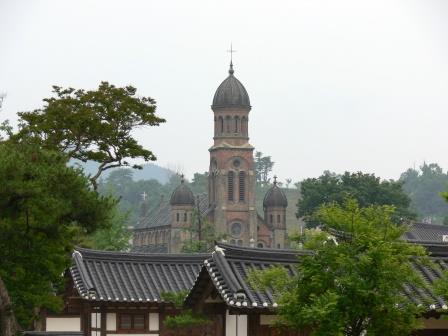
Aaron Guilliam
Religious Context Analysis
The present day South Korea is a fully functioning modern democracy. The road to democracy has been long and painful as the South Korea has endured Japanese occupation and the Korean War.
South Korea does not require any religious group to be registered or licensed. Likewise, foreign religious workers do not have to be registered.
South Korea’s population is estimated at 48,580,293. The land mass is just larger than the State of Indiana in the United States of America, making it one of the most densely populated countries in the world. South Korea is a religious country with the majority of South Koreans identifying themselves with a religion.
Christianity is the largest religion in South Korea with 31.6% of South Koreans identifying themselves as Christian (Protestant 24%, Roman Catholic 7.6%). Buddhism is the next largest religious identification at 24.2% of the population. Making up less than 5% of the population are various groups that identify with, Won Buddhism, Confucianism, Jeongsando, Cheondogyo, Daejonggyo, Jehovah’s Witness, The Church of Jesus Christ of Latter-day Saints, Seventh Day Adventist Church, Daesun Jinrihoe, The Unification Church and Islam.
Constitutional Provisions And Statutes Applicable to Religion
Constitution
The Constitution mandates that no state religion be recognized, and that church and state be separated. Thus there is no state religion in South Korea. Furthermore, the South Korean government does not subsidize or favor any particular religion. several articles in the South Korean Constitution that concern freedom of thought and religion:
Article 10 [Dignity, Pursuit of Happiness]
All citizens shall be assured of human worth and dignity and have the right to pursue happiness. It shall be the duty of the State to confirm and guarantee the fundamental and inviolable human rights of individuals:
Article 11 [Equality]
(1) All citizens shall be equal before the law, and there shall be no discrimination in political, economic, social, or cultural life on account of sex, religion, or social status.
(2) No privileged caste is recognized or ever established in any form.
(3) The awarding of decorations or distinctions of honor in any form shall be effective only for recipients, and no privileges shall ensue therefrom.
Article 19 [Conscience]
All citizens shall enjoy freedom of conscience.
Article 20 [Religion, Church]
(1) All citizens shall enjoy freedom of religion.
(2) No state religion shall be recognized, and church and state shall be separated.
Article 21 [Speech, Press, Assembly, Association, Honor, Public Morals]
(1) All citizens shall enjoy freedom of speech and the press, and freedom of assembly and association.
(2) Licensing or censorship of speech and the press, and licensing of assembly and association shall not be recognized.
(3) The standards of news service and broadcast facilities and matters necessary to ensure the functions of newspapers shall be determined by Act.
(4) Neither speech nor the press shall violate the honor or rights of other persons nor undermine public morals or social ethics. Should speech or the press violate the honor or rights of other persons, claims may be made for the damage resulting therefrom.
Article 37 [Freedoms and Rights]
(1) Freedoms and rights of citizens shall not be neglected on the grounds that they are not enumerated in the Constitution.
(2) The freedoms and rights of citizens may be restricted by Act only when necessary for national security, the maintenance of law and order or for public welfare. Even when such restriction is imposed, no essential aspect of the freedom or right shall be violated .
Despite the fact that the South Korean Constitution affirms and protects freedom of conscience, several legal issues regarding the limits of this freedom have been and are in various stages of litigation. For example, Article 39 of South Korea’s Constitution requires compulsory military service. In 2012 there were approximately 733 members of the Jehovah’s Witness faith incarcerated in South Korea for the conscientious objection to military service. Article 88 of the Military Service Act allows for imprisonment for up to three years. Conscientious objectors to military service who receive prison sentences of more than 18 months become exempt from military service and face no other punishment. In 2011, the Constitutional Court upheld the Military Service Act as constitutional.
In 2012 the Masan Branch of Changwon District Court asked the Constitutional Court to re-examine the constitutionality of the law that penalizes conscientious objectors. In 2012 there were 21 cases before the Constitutional Court.
In 2012 the National Human Rights Commission found that an appeal filed by a conscientious objector had merit . The plaintiff argued that the Korea Transportation Safety Corporation refused to employ him because he had a criminal record as a conscientious objector due to his beliefs as a member of the Jehovah’s Witnesses. The Commission recommended that the Corporation’s human resources management regulation be amended to prevent similar violations in the future.
See more at the link below: